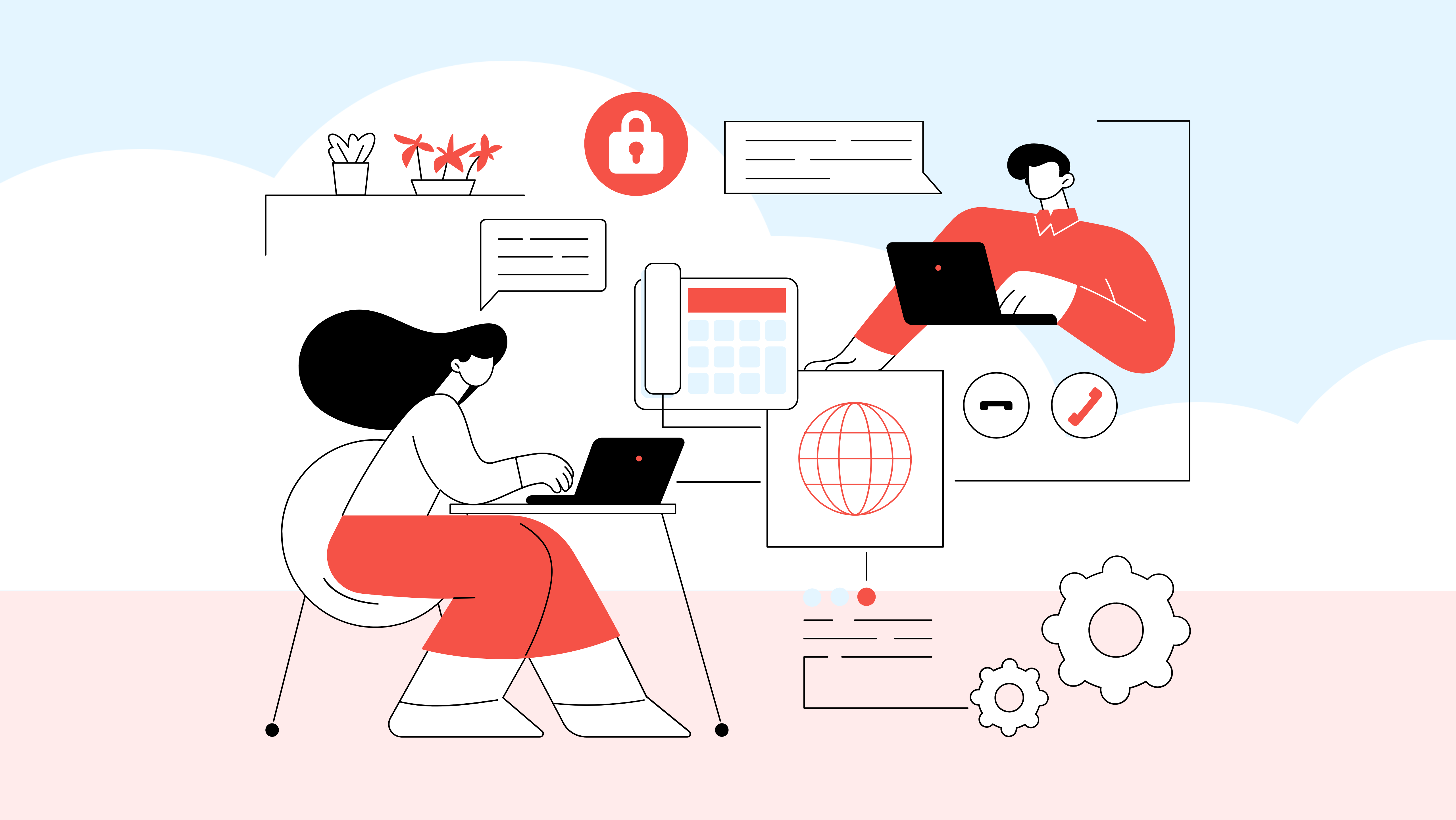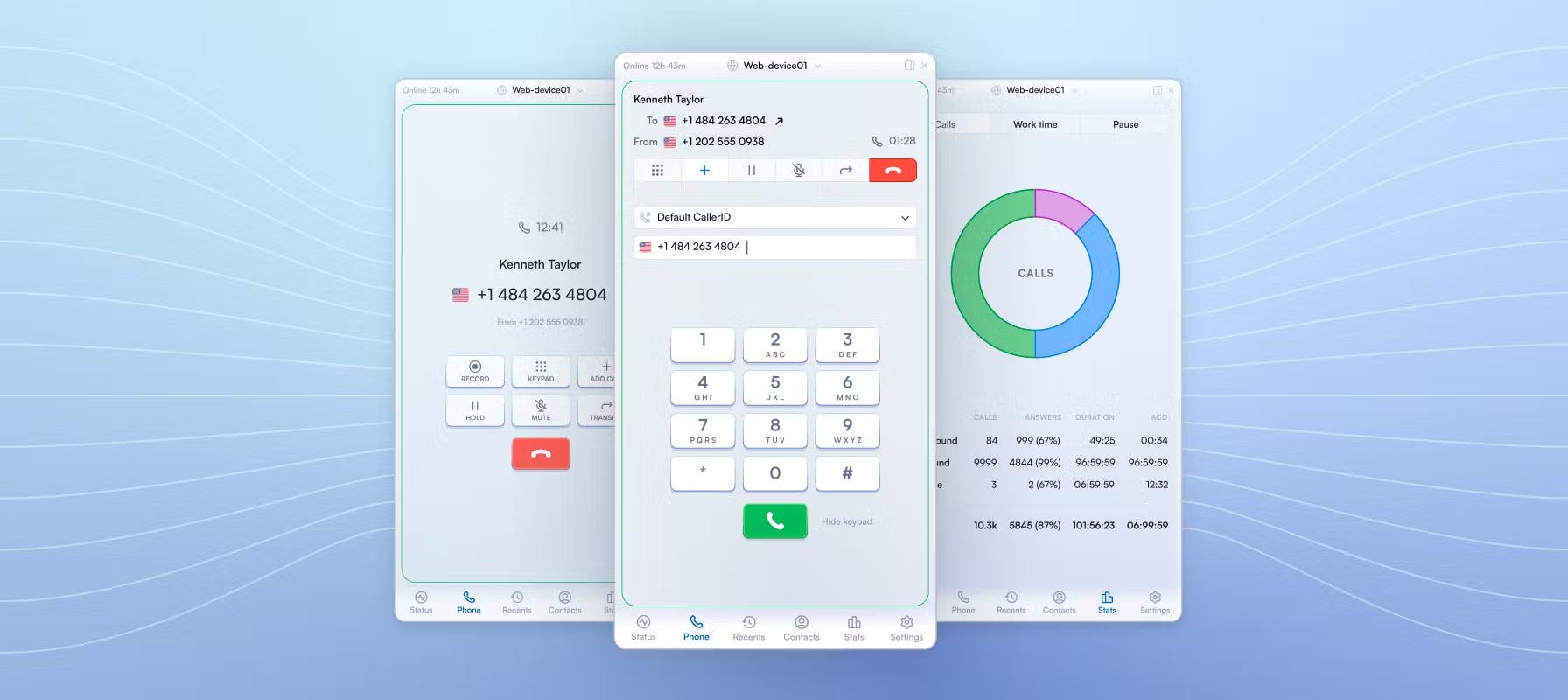Hi there!
We all know that nowadays, staying connected is more critical than ever. Whether you're an entrepreneur, a growing small business, or a private educational institution, the way you communicate can significantly influence your success.
Cloud Telephony - a transformative solution that is reshaping the future of business communications.
But what exactly is a cloud phone system, and why is it hailed as both secure and user-friendly? Let's dive in.
1. What is cloud telephony?
Cloud telephony, also known as a cloud-based phone system, revolutionizes how businesses communicate by transitioning their phone services to the internet. This forward-thinking approach leverages the vast capabilities of cloud computing to deliver a communication solution that's not only flexible and scalable but also remarkably cost-effective. Where traditional systems are bogged down by the need for physical hardware and a complex infrastructure that demands significant maintenance and upfront costs, a cloud call system presents a more streamlined, internet-based alternative.
By doing so, it eliminates the geographical limitations and rigid structures of past solutions, offering businesses of any size the ability to adapt their communication needs with ease and efficiency. This model supports a dynamic business environment, where resources can be quickly adjusted or scaled according to demand, all while keeping overhead costs to a minimum. In essence, cloud telephony opens up a new door to many possibilities for business communications, making it an indispensable tool.
Key features and benefits
- Flexibility and scalability: Easily adjust to your business needs, adding or removing lines with just a few clicks.
- Cost-effective: Reduce upfront investments and maintenance costs associated with traditional phone systems.
- Accessibility: Access your phone system from anywhere, anytime, fostering remote work and mobility.
- Advanced features: Benefit from features like voicemail to email, call forwarding, and automated attendants, previously only available to large enterprises.
2. Why is cloud telephony secure?
Security in communication is paramount, especially in an era where cyber threats loom large and the digital landscape is rife with potential vulnerabilities. Cloud-based phone systems are meticulously designed with robust, advanced security measures to protect your sensitive data and ensure confidentiality in your communications. These systems deploy encryption, secure data transmission protocols, and comprehensive cyber defense strategies to safeguard against unauthorized access and cyber attacks, offering peace of mind and reliability in your business communications. This heightened level of security is essential in maintaining trust and integrity in the digital age, ensuring that your conversations and data remain private, secure, and exclusively within the intended audience's reach.

Security features:
- Voice encryption: Utilizes state-of-the-art encryption algorithms to convert voice communications into indecipherable code, thwarting eavesdropping attempts and ensuring that conversations remain confidential between intended parties.
- TLS Encryption and Datagram Transport Layer Security (DTLS): Implements these advanced encryption protocols to secure data transmission over the internet, thereby guaranteeing that voice calls, video calls, and messages are safeguarded against interception and tampering.
- VoIP security: Employs a suite of advanced protocols and strategies to defend against common and emerging threats in voice over IP communications, including toll fraud, phishing attacks, and malware.
- Unified communications security: Offers a comprehensive, integrated approach to protect all forms of communication within your organization, encompassing email, messaging, video conferencing, and file sharing, ensuring a secure and seamless collaboration environment.
- Two-Factor Authentication (2FA): Adds an extra layer of security by requiring users to provide two forms of identification before accessing the system, significantly reducing the risk of unauthorized access.
- Regular security audits and compliance checks: Conducts periodic reviews and audits of the cloud telephony system to identify and rectify potential vulnerabilities, ensuring compliance with international security standards and regulations.
- Secure data centers: Hosts cloud telephony services in highly secure data centers equipped with physical security measures, environmental controls, and redundancy in power and connectivity to safeguard against data loss and downtime.
- End-to-End Encryption (E2EE): Ensures that data, including voice and video communications, is encrypted at the sender's device and remains encrypted until it reaches the recipient's device, preventing any possibility of interception or eavesdropping during transmission.
- Network security: Incorporates firewall protection, intrusion detection systems (IDS), and intrusion prevention systems (IPS) to monitor and protect the network infrastructure from malicious activities and attacks.
- Access control and user permissions: Manages user access rights and permissions with granular controls, allowing administrators to define who can access specific features and data, thereby minimizing the risk of internal threats and data breaches.
These security measures demonstrate a commitment to protecting sensitive information, making cloud phone services a trusted choice for businesses of all sizes.
3. Ease of use: Simplifying business communications
One of the most significant benefits of cloud-based VoIP and phone systems is their remarkable ease of use, characterized by user-friendly interfaces and uncomplicated setup processes. These systems stand out for their ability to be seamlessly integrated into various business environments, making them highly accessible to users, irrespective of their level of technical expertise or familiarity with advanced communication technologies.
The intuitive design of these platforms ensures that navigating through features and functionalities becomes a straightforward experience, eliminating the steep learning curve often associated with traditional telephony systems. Moreover, the simplicity in setup and operation allows businesses of all sizes to quickly adopt and adapt to these modern communication solutions without the need for extensive training or specialized IT support. This inherent accessibility and ease of use empower users across the board, from the tech-savvy to the tech-averse, to leverage the full spectrum of voice and data communication tools offered by cloud-based systems, enhancing overall productivity and efficiency in the workplace.
User-friendly aspects:
- Quick setup: Get your phone system up and running in no time, without the need for technical support.
- Seamless integration: Easily integrate with existing business tools and software, enhancing productivity and workflow.
- Centralized management: Manage your entire phone system through a single dashboard, from call routing to user permissions.
- Support and scalability: Enjoy ongoing support and the ability to scale your system as your business grows, all without significant additional investment.
4. Perfect for small businesses and private schools
Whether you're a small business seeking to establish a professional presence or a private school needing to streamline communication with staff and parents, cloud phone systems offer a solution that meets your needs without breaking the bank.
For small businesses:
Small businesses can now access a suite of advanced communication features that were once exclusive to large corporations, thanks to the democratizing power of cloud-based phone systems. These features include:
- Automated attendants: This virtual receptionist feature allows small businesses to present a professional image to callers, automatically greeting them and directing calls to the appropriate department or individual without the need for a live operator. It ensures efficient call management, even outside of regular business hours, improving customer experience.
- Call analytics: Access to detailed call data analytics empowers small businesses with insights into customer interactions, call volumes, peak call times, and call duration patterns. This data can be instrumental in making informed decisions about staffing, customer service strategies, and operational improvements. It also helps in tracking marketing campaign performance and optimizing communication strategies for better customer engagement.
- Scalability: Cloud phone systems can easily scale with your business growth, allowing you to add or remove users, features, and services as needed without significant capital expenditure. This flexibility ensures that your communication capabilities can evolve in tandem with your business.
- Cost efficiency: By leveraging cloud technology, small businesses can enjoy significant cost savings on communication expenses. There's no need for large upfront investments in physical hardware or ongoing maintenance costs, and the pay-as-you-go pricing model allows businesses to pay only for what they use.
- Mobility: With features like mobile apps and the ability to use business numbers on personal devices, employees can stay connected no matter where they are, ensuring they never miss important calls and can maintain productivity while on the move.
If you're looking for a softphone solution, one of our dedicated teams at BinarCode is currently developing it for PBX.im, you can signup already so you don't miss it.

For private schools:
Private schools can benefit greatly from the adoption of cloud phone systems, which offer an array of features designed to support educational environments:
- Announcements: Easily disseminate important information to staff, students, and parents through broadcast messages or pre-recorded announcements. This is particularly useful for emergency notifications, event reminders, or any significant updates that need to be communicated swiftly and efficiently.
- Parent-teacher interactions: Facilitate better communication between parents and teachers with dedicated lines, voicemail services, and the ability to route calls directly to teachers' extensions. This enhances the parent-teacher relationship by making it easier to discuss student progress, schedule meetings, and address concerns promptly.
- Administrative efficiency: Cloud-based systems streamline various administrative tasks through features like automated call distribution, directory services, and integration with school management software. This reduces the workload on administrative staff, allowing them to focus more on student and teacher support.
- Security and privacy: Enhanced security features ensure that all communications are protected, maintaining the privacy of students, parents, and staff. This is crucial for schools that handle sensitive information.
- Cost-effective communication: With predictable monthly costs and no need for expensive on-premise equipment, private schools can manage their budgets more effectively while still benefiting from a comprehensive communication system.
These enhancements provided by cloud phone systems for small businesses and private schools not only improve operational efficiency but also foster a more connected, responsive, and engaged community.
According to TechTarget, some of the Cloud telephony vendor offerings include the following:
- "8x8. With features such as call handling, conferencing, auto-attendant, Short Message Service (SMS), team messaging and voicemail services with transcription, the 8x8 basic package is designed for small businesses. An upgrade option for larger organizations includes a bundle with single sign-on, integrations with Okta, unlimited faxes and phone recording.
- Cisco Webex Calling. This cloud telephony system caters to midsize businesses, enabling users to make and receive calls across any Cisco IP device, regardless of their location. Cisco Webex also offers end-to-end encryption for calls.
- Dialpad. Dialpad offers teams AI voice technology to optimize call volumes and customer services, along with advanced phone features, such as SMS, instant messaging and video conferencing.
- Google Voice. Google Voice simplifies communication by consolidating telephone numbers, enabling users to receive calls on all their devices, exchange messages, and send and receive voicemails. Available on both iOS and Android platforms, the app is designed for users who want the convenience of having a single number ring on multiple devices simultaneously.
- MagicJack. Established in 2007, this provider offers services similar to a traditional home phone. But, instead of relying on a physical phone line, MagicJack uses an internet connection. Over time, the service has evolved to enable users to make calls while traveling and even receive home phone calls on their smartphones.
- Nextiva. Designed for small to midsize teams of remote, in-house and hybrid workers, Nextiva provides an all-in-one communications service.
- RingCentral. Businesses of all sizes can use the video, text and chat services -- all with the security of an enterprise-grade encrypted phone system.
- Vonage. Vonage Business Communications is designed for organizations that require essential communication channels, such as voice, team chat, SMS and video, but not additional features, such as routing or queueing."
The future is here
Cloud telephony represents the future of business communication, combining security, flexibility, and ease of use into a single, powerful solution. By choosing a cloud-based phone system, you're not just investing in a communication tool; you're embracing a technology that can transform your business or educational institution's operational efficiency and security posture.
Embrace the future with a cloud phone system and unlock a world of possibilities for your business or school. Secure, scalable, and simple to use, it's the smart choice for those looking to save time, money and work smart!
Safety and security don’t just happen; they are the result of collective consensus and public investment.


